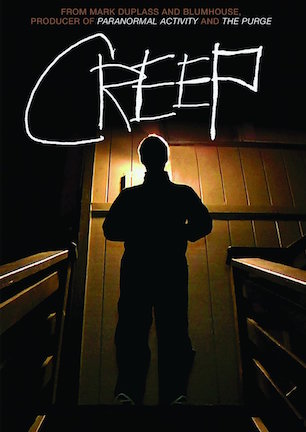Studio: The Orchard
Director: Patrick Brice
Writer: Mark Duplass, Patrick Brice
Producer: Mark Duplass, Jason Blum
Stars: Mark Duplass, Patrick Brice
Review Score:
Summary:
A desperate videographer responds to a cryptic ad placed by a strange man who wants to record his dying days for an unborn child.
Review:
Other than the occasional bargain deal on gently used Ikea furniture, has anything good ever come from answering a Craigslist personal? Aaron is smart enough to know better, but cash-strapped enough to ignore his instincts when he responds to a vague ad offering $1000 for the use of a video camera, eight hours of time, and absolute discretion.
When he follows the instructions to a remote cabin in the woods, it seems that Aaron is about to be the primary player in what would undoubtedly be a horror story setup either onscreen or off. And while a secluded home, a cryptic solicitation, and a mysterious stranger are indeed familiar tropes, "Creep" has an unexpected delivery that uses these ingredients for a freshly unusual look at the powderkeg relationship between two odd men.
Josef is the man who placed the ad. Diagnosed with an inoperable brain tumor, Josef has just a few months left on his clock. With his wife six months pregnant, Josef is looking to recreate the Michael Keaton movie "My Life" by recording a video diary for his unborn child. Of course, what starts as a curious but understandable approach to coping with cancer takes a much darker turn the more Aaron gets to know Josef, and the closer Josef tries getting to Aaron.
Shot and edited over the course of a year and a half, "Creep" was entirely improvised from a 10-page outline, although you would never know there wasn't a script if no one told you. Co-writers and co-stars Mark Duplass and Patrick Brice, who also directed, took an idea about seeing how two character types might interact with each other and allowed it to develop both naturally and unnaturally. Their result is an organic story that is deeply rich in complexity despite having only two actors and one handheld camera between them.
Before dismissing "Creep" out of hand because it is "found footage," know that this is one of those all too rare instances where the first-person conceit is thoughtfully integrated into the story, and it would not have worked any other way. Shots seem so well crafted and preplanned that it is almost impossible to believe in the improvisational birth of the film. Brice knows how to use the format to his movie's advantage, taking the camera out of its operator's hands at key moments to give the audience information the characters do not have, and exploiting the lens' limited field of view for white-knuckled tunnel trips down dark corridors with blind turns.
Often when actors write a script for themselves, or in this case a treatment, what they are really doing is drafting a vanity piece that affords an opportunity to play the roles they want, or some other selfish indulgence. "Creep" is a case where no one but its creators can play the two roles because they are the only ones who could ever fully understand the subtle textures to these personalities.
Aaron and Josef are similar in many respects. Both men are lonely, somewhat socially awkward, desperate to a degree, and prone to at least mildly duplicitous behavior. Where they differ is in exactly what secrets they hide from one another and in how they calculate ways to win control of a confrontation with the other.
It's no spoiler to reveal that Josef turns out to be a dangerous person, although Aaron is not at all a typically helpless foil. The strength of Josef's character and how Mark Duplass plays him is in his portrayal as a Johnny Lunchpail variety of sociopath. Josef is as deviously twisted as Hannibal Lecter or Norman Bates, but with an Everyman coating that makes him vulnerable and sympathetic, even when your Spidey Sense never stops tingling in his presence. It is this indescribable mixture of traits that makes being around him simultaneously stressful yet infinitely fascinating.
Josef inflicts just enough psychological terror so that he can still be manipulative through an emotional appeal. His outward behavior only suggests a threat level that would require a restraining order while the look on his face suggests being armed with a sharp weapon would be better. That Aaron and the audience are in synch with this push-pull sentiment of uncertainty towards Josef is what makes "Creep" relatable as a strangely enjoyable, yet still distressing experience.
Describing "Creep" as comedic would be a misnomer, but there is an underlying sense of humor that comes from the bizarre nature of the circumstances. The whole gamut of what happens to Aaron involves enough oddities to inspire laughter without betraying the pervasive dread dripping from terror-laced tension. It is just enough of a humor spike to provide a mild respite before the next uncomfortable arc of suspense.
Simply conceived and executed with precision, "Creep" is a horror experiment between two filmmakers that gives its audience a much-needed excuse to remember how "found footage" can be effective when presented through a personal perspective. It is also a remarkable monument to how much can be achieved with a low budget and limited resources when a simple concept is so smartly delivered that its limitations do not even matter.
Review Score: 80
Click here for Culture Crypt's review of the sequel, "Creep 2."







It’s moderately more watchable than “Popeye’s Revenge,” though that’s like saying being mauled by a bear is preferable to being mauled by a lion.